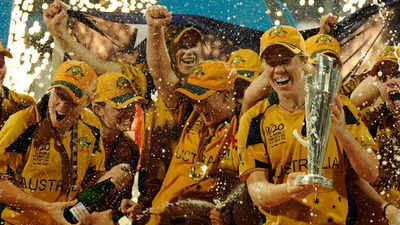
Australia women's team (X Photo - @T20WorldCup)
NEW DELHI: The
Australian women's team
have dominated the
Women's T20 World Cup
. Since 2010, the tournament has been held seven times, and
Australia
have clinched the trophy on six occasions. Only in 2016 did the
West Indies
manage to win the trophy, doing so in India.
It was a golden year for West Indies in T20 cricket, as their men's team also won the T20 World Cup in India.
The inaugural Women's T20 World Cup was won by England in 2009.
The Australian women's team, who have played in seven T20 World Cup finals, lifted their first trophy in 2010 thanks to a boot. It was none other than a young
Ellyse Perry
's boot, as she bowled the final over against New Zealand's
Sophie Devine
and Liz Perry.
Sophie Devine, who was unbeaten on 38 from 35 balls while chasing a target of 107 runs, anchored the innings from one end as wickets kept falling from the other.
Devine hit a four and a six in the second-to-last over bowled by Rene Farrell, reducing New Zealand's target to 14 runs off the final six deliveries.
Liz Perry, who was at the crease, successfully took a single off the first ball of the last over, leaving her team requiring 13 runs from the remaining five balls.
Sophie Devine then took charge, managing to hit four consecutive twos. With five runs needed off the final delivery, Perry bowled stump to stump.
Ellyse Perry in Each and Every T20 World Cup | #ellyseperry #shortsvideo #shorts #short #shortvideo
Devine connected well with a straight shot, but Perry, who is also a skilled football player, managed to deflect the ball with her boot towards mid-on. As a result, New Zealand concluded their innings at 103 for the loss of six wickets.
Perry excelled throughout the Women's World T20 in the Caribbean, being Australia's leading wicket-taker. She was named 'Player of the Match' in the final for taking 3 wickets in 4 overs and conceding only 18 runs.
In contrast to the West Indies' triumph in 2016, Australia's men's team fell short in the 2010 final, losing to England. Despite the disappointment, Michael Clarke, David Warner, and Mitchell Johnson stayed behind to show their support for the Australian women's team who ultimately clinched the trophy.









 English (US) ·
English (US) ·